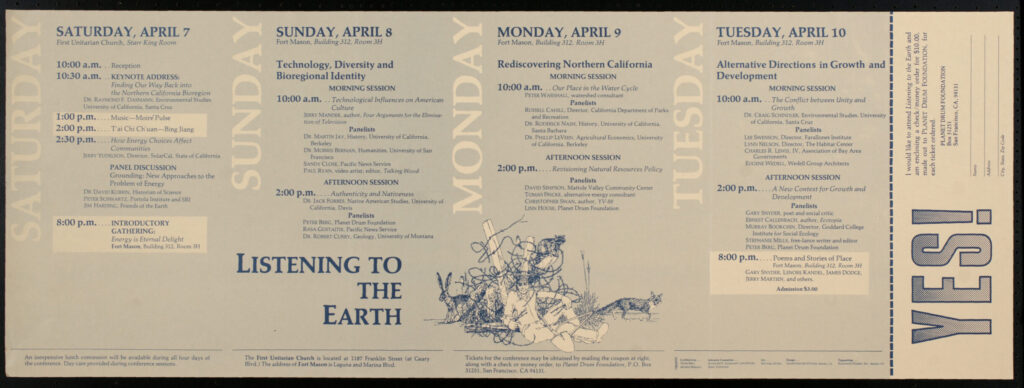

___________________
More about the symposium:
- Co-director Morris Berman describes the symposium in Raise the Stakes #1.
- A transcription of [Freeman] Linn House’s April 9 talk is in Raise the Stakes #2.
- A transcription of the April 10 panel discussion is in Raise the Stakes #3.
___________________
The Bioregional Basis of Community Consciousness
A Public Symposium April 7-10, 1979 San Francisco
Are we /\out of place in Northern California?
Our Society is Heading in Two Conflicting Directions. One of these is the attempt to preserve regional culture, community identity, natural resources and political autonomy. The second retains the impetus of the Industrial Revolution and involves an expanding economy, increased urbanization and the spread of what might be called a global and largely homogenous way of life. The conflict between these is expressing itself in some of the most crucial issues of our time—crises in energy, natural resources, growth and development and cultural priorities.
California is proving to be a Major Testing Ground for the Resolution of these issues. All of us living here are being affected by the kinds of energy choices being made by conflicts between industrial development and environmental protection; by rapid technological innovation; and by the struggle to maintain a sense of community and cultural identity. In both voter referenda and public debate, California has been the stage of a number of initial confrontations regarding these issues.
These issues Exist within a Bioregional Context. All of the activities of human society are ultimately supported by the Earth’s biosphere, the web of life which covers the planet with the essential air, water plants, animals and materials our lives require. Our lives and and the life of the planet come together in bioregions, “home places” united by particular natural characteristics and human influences that are specific to these locales. Relating these issues to the specific nature of the Northern California Bioregion may open up new possibilities for resolutions.
What Could a Bioregional Perspective Hope to Achieve? Could it emphasize diversity, seek solutions to our problems That are place-specific? Could it also emphasize unity in attempting to reestablish a sense of connectedness between urban, suburban and rural locales? Could it relate these locales to the natural systems they share? Finally, could it extend the concept local identity to a recognition of planetary interdependence?
This is what we seek to explore.
On April 7, 8, 9 and 10 leading environmental thinkers, representatives of government agencies, scholars in the humanities, innovators in alternative energy and agriculture, social critics and authors will meet in a public symposium to address these issues and to examine what possibilities exist for social and individual action.
You are invited to join them in that effort.
Schedule
Saturday, April 7th
First Unitarian Church, Starr King Room
10:00 am Reception
10:30 am Keynote Address:
Finding Our Way Back Into the Northern California Bioregion
DR. RAYMOND F. DASMANN , Environmental Studies, University of California, Santa Cruz
1:00 pm Music – Moire’ Pulse
2:00 pm T’ai Chi Ch’uan – Bing Jiang
2:30 pm How Energy Choices Affect Communities
JERRY YUDELSON, Director, Solar Cal, State of California
Panel Discussion
DR. DAVID KUBRIN, Historian of Science
PETER SCHWARTZ, Portola Institute and SRI
JIM HARDING, Friends of the Earth
8:00 pm Introductory Gathering
Energy is Eternal Delight
Fort Mason, Building 312, Room 3-H
<<<<====>>>>
Sunday, April 8th
Fort Mason, Building 312, Room 3-H
Technology, Diversity and Bioregional Identity
Morning Session
10:00 am Technological Influences on American Culture JERRY MANDER, author, Four Arguments for the Elimination of Television
Panelists
DR. MARTIN JAY, History, University of California, Berkeley
DR. MORRIS BERMAN, Humanities, University of San Francisco
SANDY CLOSE, Pacific News Service
PAUL RYAN, video artist, editor: Talking Wood
Afternoon Session
2:00 pm Authenticity and Nativeness
DR. JACK FORBES, Native American Studies University of California, University of California, Davis
Panelists
PETER BERG, Planet Drum Foundation
RASA GUSTAITIS, Pacific News Service
DR. ROBERT CURRY, Geology, University of Montana
<<<<====>>>>
Monday, April 9th
Fort Mason, Building 312, Room 3-H
Rediscovering Northern California
Morning Session
10:00 am Our Place in the Water Cycle
PETER MARSHALL, Watershed Consultant
Panelists
RUSSEL CAHILL, Director, California Department of Parks and Recreation
DR. RODERICK NASH, History, University of California, Santa Barbara
DR. PHILLIP LeVEEN, Agricultural Economics, University of California, Berkeley
Afternoon Session
2:00 pm – Revisioning Natural Resources Policy
DAVID SIMPSON, Mattole Valley Community Center
TOMAS FRICKE, Alternative Energy Consultant
CHRISTOPEHER SWANN, Author, YV-88
LINN HOUSE, Planet Drum Foundation
<<<<====>>>>
Tuesday, April 10th
Fort Mason, Building 312, Room 3-H
Alternative Directions in Growth and Development
Morning Session
10:00 am The Conflict Between Unity and Growth
DR. CRAIG SCHINDLER, environmental Studies University of California, Santa Cruz
Panelists
LEE SWENSON, Director, Farallones Institute
LYNN NELSON, Director, The Habitat Center
CHARLES R. LEWIS, IV, Assn. of Bay Area Governments
EUGENE WEDELL, Wedell Group Architects
Afternoon Session
2:00 pm – A New Context for Growth and Development
Panelists
GARY SNYDER, poet and social critic
ERNEST CALLENBACH, author, Ecotopia
MURRAY BOOKCHIN, Director, Goddard College, Institute for Social Ecology
STEPHANIE MILLS, free-lance writer and editor
PETER BERG, Planet Drum Foundation
<<<<====>>>>
8:00 pm – Poems and Stories of Place
Fort Mason, Building 312, Room 3-H
GARY SNYDER, LENORE KANDEL, JAMES DODGE, JERRY MARTIEN and others Admissions – $3.00
<<<<====>>>>
Sponsored by Planet Drum Foundation with a grant from
California Council for the Humanities in Public Policy
Credits
Co-Directors: Peter Berg, Morris Berman, Jerry Yudelson
Advisory Committee: Raymond F. Dasmann, Linn House
Art: Michael Myers
Design: Sharpshooter Studio, Berkeley, CA
Type Setting: Randolph Harris Inc., Berkeley, CA

Reader Interactions